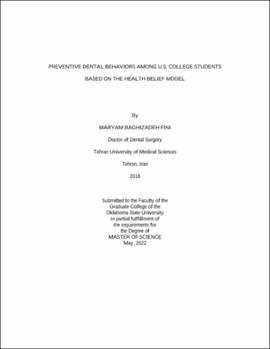| dc.contributor.advisor | Han, Ho | |
| dc.contributor.author | Baghizadeh Fini, Maryam | |
| dc.date.accessioned | 2023-04-03T20:51:32Z | |
| dc.date.available | 2023-04-03T20:51:32Z | |
| dc.date.issued | 2022-05 | |
| dc.identifier.uri | https://hdl.handle.net/11244/337221 | |
| dc.description.abstract | Introduction. Individuals' beliefs about oral diseases can influence their preventive dental behaviors such as tooth brushing, tooth flossing, and regular dental checkups. The Health Belief Model (HBM) has been frequently utilized in behavioral studies to better understand health behaviors, and it can be used as an indicator of preventive dental behaviors. Studying the impact of COVID-19 on preventive dental behaviors would be also necessary to develop the foundation for future intervention research. | |
| dc.description.abstract | Purpose. To evaluate college students' preventive dental behaviors based on HBM, identify key constructs of HBM to promote preventive dental behaviors, and determine the impact of the COVID-19 pandemic on college students’ preventive dental behaviors. | |
| dc.description.abstract | Method. 550 college students (ages 18 to 25; 69.8% female) participated in the study. An online survey was used for data collection. Descriptive statistics were calculated for demographic, COVID-19 variables, and the prevalence of preventive dental behaviors. After adjusting demographic characteristics, a multivariate analysis of variance was used to examine the relationship between the HBM constructs and preventive dental behaviors. In addition, chi-square was used to determine the prevalence of preventive dental behaviors associated with dental knowledge. | |
| dc.description.abstract | Result. Perceived barriers and self-efficacy were significant predictors of preventive dental behaviors among college students (p < 0.001). Also, a significantly higher proportion of students with sufficient dental knowledge met the recommendations for tooth brushing and regular dental checkups compared to those with deficient and moderate dental knowledge (p < 0.05). Although most of the participants (about 80~89%) claimed that the COVID-19 pandemic had no influence on their preventive dental behaviors, a considerable number of the students still reported positive and negative influences of COVID-19 on their behaviors. | |
| dc.description.abstract | Conclusion. The Health Belief Model could be an effective framework to promote preventive dental behaviors for college students, particularly, using perceived barriers and self-efficacy. In addition, increasing dental knowledge could be another effective strategy to promote preventive dental behaviors. Lastly, an intervention program for promoting preventive dental behaviors would be beneficial when the behaviors are treated as daily habits rather than common health-related behaviors. | |
| dc.format | application/pdf | |
| dc.language | en_US | |
| dc.rights | Copyright is held by the author who has granted the Oklahoma State University Library the non-exclusive right to share this material in its institutional repository. Contact Digital Library Services at lib-dls@okstate.edu or 405-744-9161 for the permission policy on the use, reproduction or distribution of this material. | |
| dc.title | Preventive dental behaviors among U.S. college students based on the Health Belief Model | |
| dc.contributor.committeeMember | Rhoads, Kelley E. | |
| dc.contributor.committeeMember | Mahaffey, Carlos C. | |
| osu.filename | BaghizadehFini_okstate_0664M_17644.pdf | |
| osu.accesstype | Open Access | |
| dc.type.genre | Thesis | |
| dc.type.material | Text | |
| thesis.degree.discipline | Health and Human Performance | |
| thesis.degree.grantor | Oklahoma State University | |
